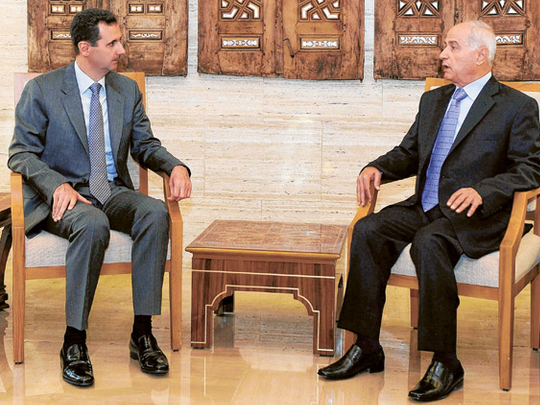
Beirut: Ever since Bashar Al Assad became president of Syria nearly 11 years ago, he has confounded analysts, diplomats, journalists and pundits alike.
Is he the shy, slightly goofy character who comes across in his public addresses, whose genuine desire to reform his country has been thwarted by vested interests within the regime and a succession of foreign crises?
Or is he, in fact, cast from the same stern mould as his father, Hafez Al Assad, a rigid autocrat who sacrifices freedoms to ensure regime survival and stave off the instability that saw Syria prone to multiple coups in the years before the Baath Party took power in 1963?
Just two months after he was sworn in as president, the Palestinian Al Aqsa intifada broke out in the West Bank and Gaza, an event that put Damascus in the spotlight given its backing for groups such as Hamas and Palestinian Islamic Jihad.
Nuclear facility
Then, a year later, came the September 11 attacks and the beginning of the Bush administration's war on terror.
Although Damascus cooperated with the United States against Al Qaida in the initial stages of the campaign, by 2003, relations had deteriorated badly in the build up to the US-led invasion of Iraq.
In 2006, Israel fought a war with Syria's Lebanese ally, Hezbollah. A year later, Israeli jets bombed an alleged nuclear facility under construction in eastern Syria, placing Damascus in the spotlight of international nuclear watchdog, the IAEA. "He's had a series of crises and he feels that his whole mind has been focused on foreign crisis and survival for Syria, stability for Syria," says Patrick Seale, a British journalist and biographer of Hafez Al Assad.
Al Assad was similarly reluctant to offer concessions during the Baath Party conference in June 2005 at the height of Syria's isolation. Prior to the conference, he announced it would signal a "leap for development," giving rise to expectations that humiliation of troop pullout from Lebanon and international pressure would force him to make some long-awaited reforms.
But the results fell far short of expectations.
"He doesn't like to be pushed around," says Seale. "He inherited that from his father. He doesn't like to have to yield under pressure." Although the state has loosened its grip on the economy in recent years, leading to a partial liberalisation, deeper political reforms failed to emerge even when the Al Assad regime found itself in a more comfortable environment. That raises questions over whether Al Assad really is a reformer at heart.
A brief period of relative political openness in spring 2001 was quickly suppressed and some opposition figures imprisoned. But a former adviser to Al Assad, who requested anonymity, recalls in the early stages of Al Assad's presidency that there were a number of administrative, economic, and legal reforms being proposed.
For Syria's opposition, there is little ambiguity over Assad's true nature.












